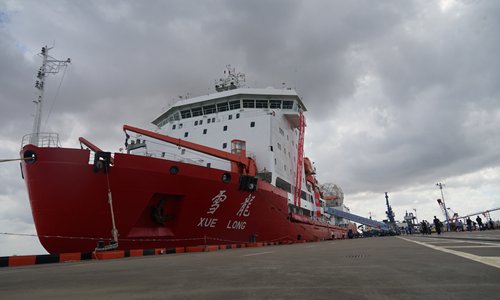HOME >> BUSINESS
China to enhance communication ability in Northeast Passage of Arctic
Source:Global Times Published: 2019/9/3 22:18:40

China's Icebreaker Xue Long with the ninth Arctic Expedition Team members on board arrives in Shanghai on September 26, 2018. Photo: IC
China's Ministry of Transport is organizing a test team to explore the nation's short-wave communication guarantee capability in the Northeast Passage (NEP) of the Arctic.
Experts on Tuesday noted that the test mirrors China's plan to normalize the route's commercial operation, both for strategic and economic reasons.
It will be the third time for China to conduct communication-related tests in the Arctic. The team will also evaluate the feasibility of building an Arctic support radio station and explore the BeiDou satellite navigation system's signal coverage in the area, the Xinhua News Agency reported on Tuesday.
"The Arctic resource race is on, and the US and Russia are already in. Normalization of the NEP could give China a head start in the competition," Zhao Junjie, a research fellow at the Chinese Academy of Social Sciences' Institute of European Studies, told the Global Times on Tuesday.
The NEP, which is also called the "Ice Silk Road", is more cost-effective than current shipping routes. It will save time, cut fuel consumption and reduce political risks, observers said.
The new sea route will be a shortcut to Western Europe compared with the current one, which transits the Malacca Strait and then passes through the Indian Ocean and the Suez Canal. The trip is about nine days (or 25 percent) shorter than the current itinerary, and the route saves 300 tons of oil, media reports said.
"The passage usually closes for more than half a year due to icebergs. The melting of glaciers in the Arctic Circle may prolong the opening period and add to the economic benefits," Zhao noted.
Russian liquefied natural gas (LNG) carrier Vladimir Rusanov recently shipped about 70,000 tons of LNG to North China's Tianjin via the Ice Silk Road, which was about 60 percent shorter than the traditional route, domestic news site ce.cn reported on Aug 27.
The test team also plans to study the BeiDou system's signal coverage, positioning accuracy and short message communication capability in the Arctic region, in a bid to provide data support for BeiDou to join the Global Maritime Distress and Safety System, reported Xinhua, citing Zhao Fenglong, official of the North Sea navigation support center under the Ministry of Transport.
Zhao Junjie said that the Arctic is a critical point for the construction of the China-developed BeiDou Navigation System, which will begin global service next year, and shoring up the system in the region will greatly promote the overall navigation technology.
BeiDou has been able to provide a stable network in the Asia-Pacific and southern latitudes, Zhao Junjie noted.
Posted in: INDUSTRIES